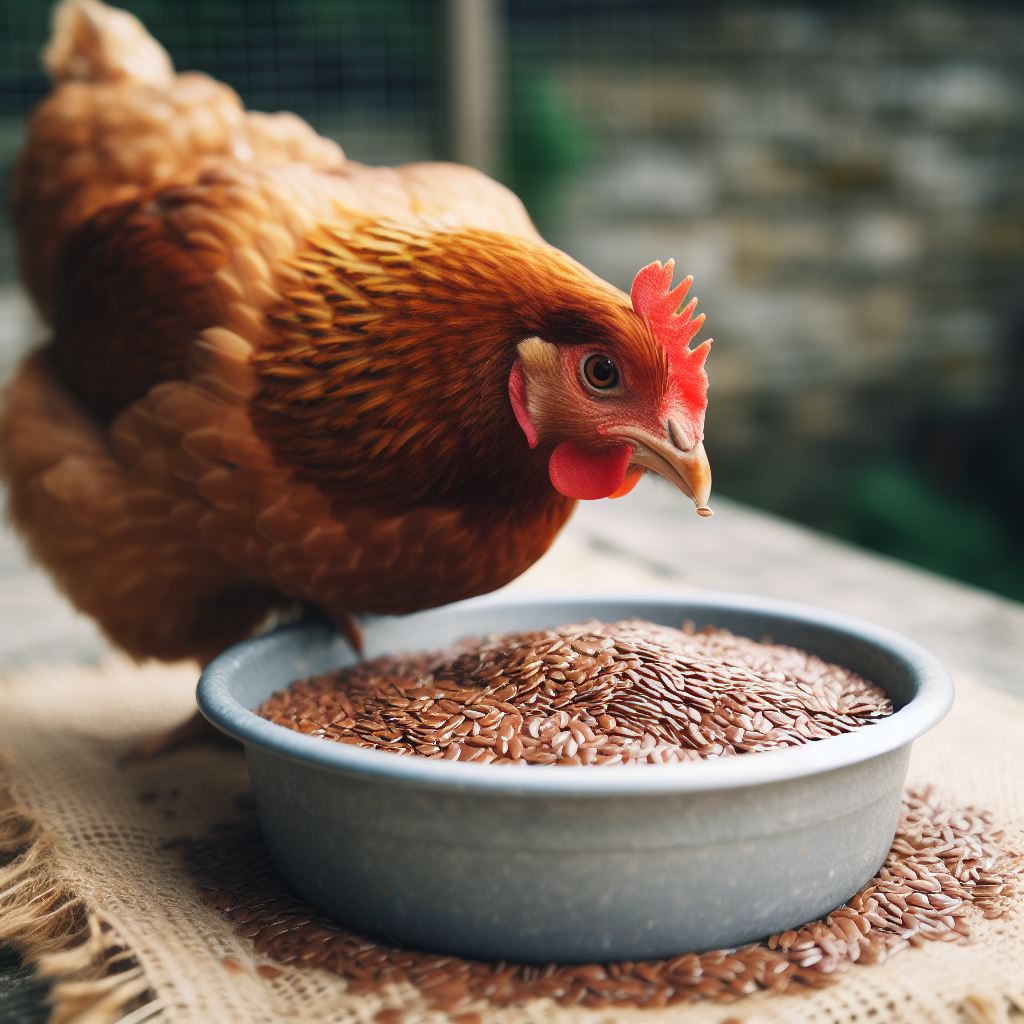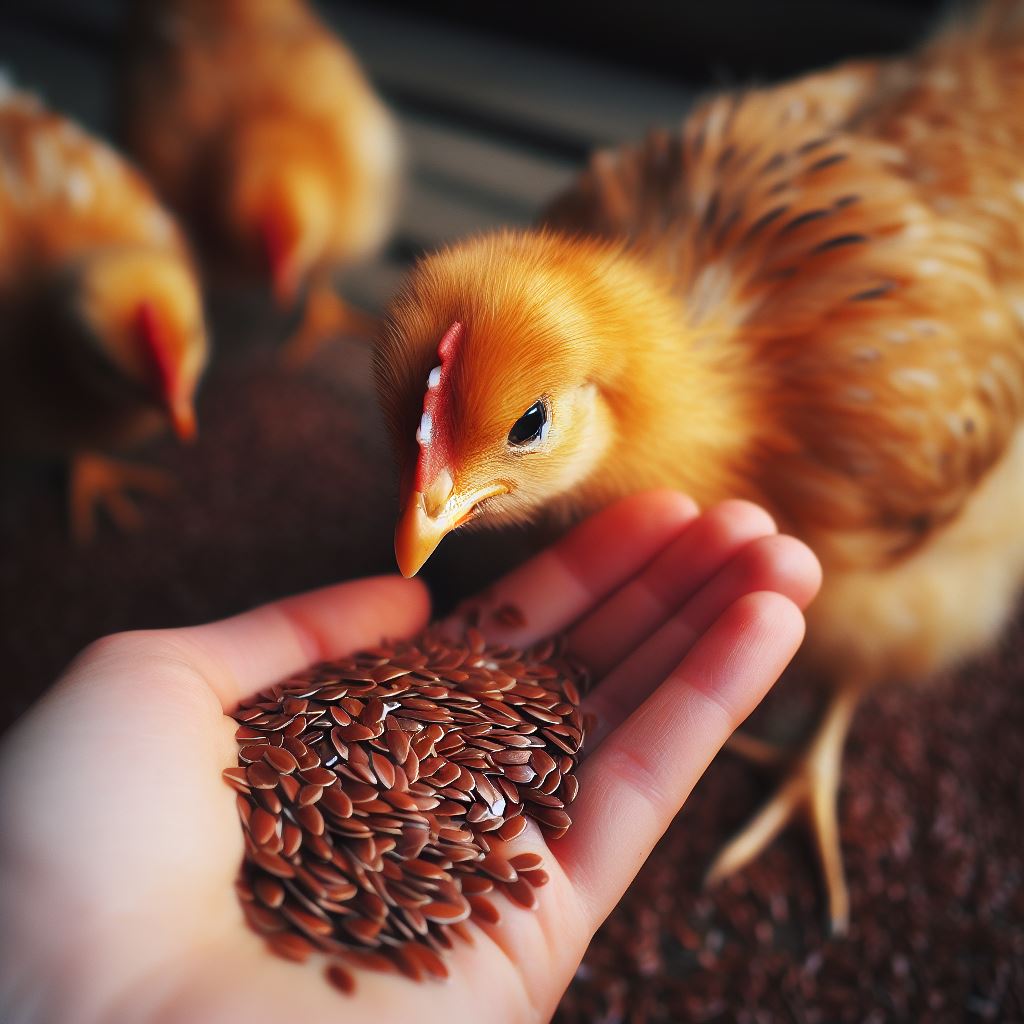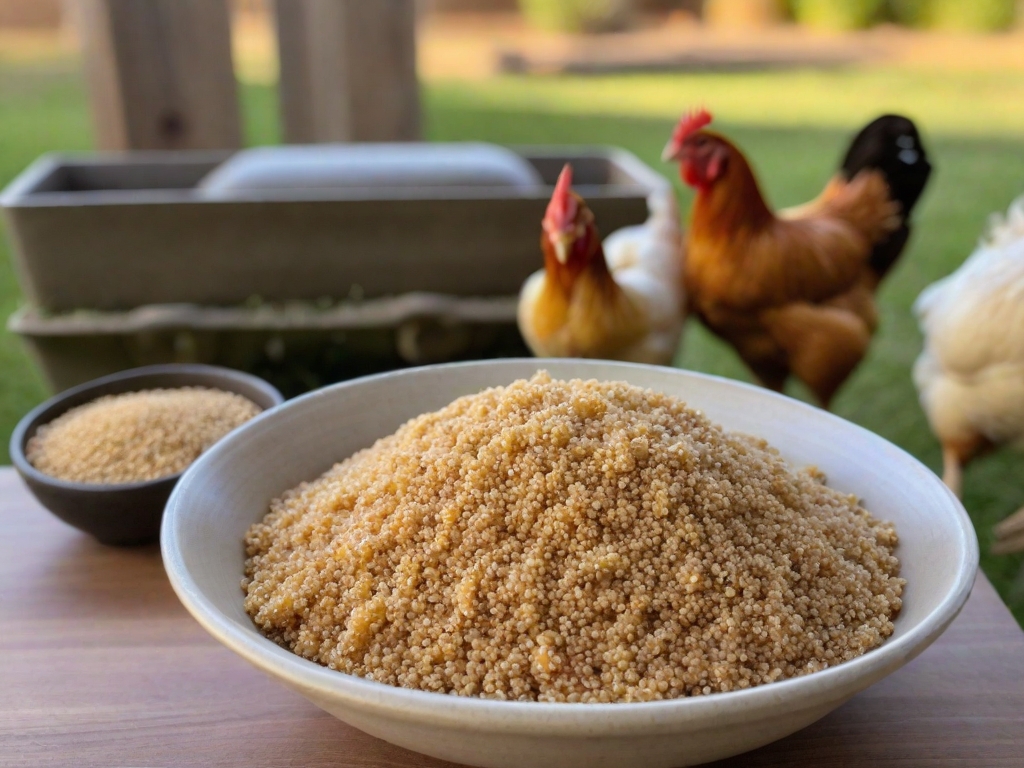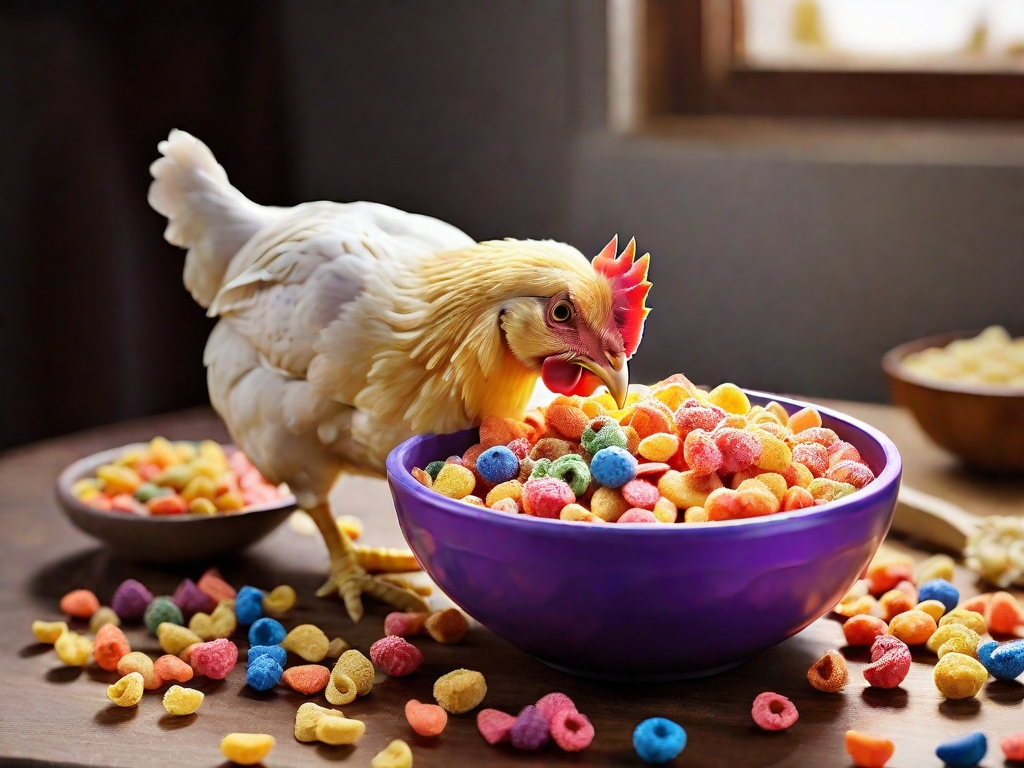Can Chickens Eat Flax Seeds?

Table of content:
- Are Flax Seeds Safe for Chickens?
- How Much Flax Seed Can Chickens Eat? Recommended Dosage
- Do Chickens Like the Taste of Flax Seeds?
- Are There Any Health Concerns When Feeding Flax Seeds?
- What Are the Benefits of Flax Seeds for Chickens?
- Simple Ways to Add Flax Seeds to Your Chickens’ Diet
- Should You Feed Flax Seeds to Chickens?
- Frequently Asked Questions
- Conclusion
Yes, chickens can eat flax seeds in moderation. Flax provides healthy omega-3 fats, antioxidants, protein, and fiber. However, too much may cause digestive upset. Grind seeds and limit to 1-2 teaspoons per chicken daily.
As a chicken owner, you may be wondering if you can share the benefits of flax seeds with your flock. The good news is that flax seeds are generally safe for chickens to eat and can provide some nutritional benefits when fed in moderation.
Flax seeds are small, flat, and oval-shaped seeds that are brown or yellow in color. Flax seeds are exceptionally rich in healthy fats, antioxidants, and fiber:
- Omega-3 fatty acids – Flax seeds contain high levels of alpha-linolenic acid (ALA), an omega-3 fat that has anti-inflammatory properties. Omega-3s are great for chicken health.
- Protein – Flax seeds contain approximately 20-25% protein, providing amino acids that chickens need.
- Fiber – The hard shells give flax seeds a crunchy texture and plenty of insoluble fiber. This aids digestion.
- Lignans – These antioxidants in flax seeds have health benefits from reducing inflammation to stabilizing hormones.
Flax seeds can be a nutritious supplement to a chicken’s diet. They provide nutrients that support egg production, feather growth, and overall wellness.
However, there are some important considerations when feeding flax seeds to chickens:
- Rancidity – Flax seeds can go rancid quickly after being ground up. Only feed freshly ground flax meal.
- Dosage – More is not necessarily better with flax seeds. Too many can cause digestive upset.
- Whole vs ground – Whole flax seeds may pass undigested. Optimal nutrition comes from freshly ground flax meal.
Understanding proper dosage, storage, and preparation is key to safely providing flax seeds.
Are Flax Seeds Safe for Chickens?
Flax seeds are generally recognized as safe for chickens to consume. However, chickens cannot digest whole flax seeds efficiently. Whole flax seeds may pass undigested through their system.
To allow chickens to absorb the nutrients, it is best to feed freshly ground flaxseed meal. Grinding the flax breaks down the hard outer shell and makes the insides more digestible.
When feeding ground flaxseed in appropriate portions, chickens can enjoy the following benefits:
- Increased omega-3 fatty acids for improved immunity and egg nutrition
- Added protein for growth and feather production
- More fiber to promote digestion
- Extra antioxidants from lignans that reduce inflammation
However, too much flaxseed can cause issues:
- Digestive upset or reduced absorption of nutrients
- Loose droppings due to extra fiber
- Reduced intake of other foods leads to imbalance
- Inhibited uptake of iodine, which is needed for hormones
Moderation is key when supplementing chickens’ diet with flax seeds. Follow dosage guidelines to provide the benefits without side effects. Monitor chickens after introducing flax to watch for any adverse reactions.
How Much Flax Seed Can Chickens Eat? Recommended Dosage
When adding flax seeds to your chickens’ diet, how much is too much? Here are some general dosage guidelines to follow:
- For adult chickens, feed 1-2 teaspoons of freshly ground flax per bird per day.
- Limit flax to no more than 5% of the total feed intake.
- Reduce amounts for smaller or bantam chickens. Start with just 1/4 teaspoon daily.
- Chicks should not eat flax until at least 6 months old.
Spread the flax meal out throughout the day over multiple feedings. To encourage intake, you can mix flax into:
- Wet mashes or moistened feed
- Scrambled eggs or egg food
- Yogurt, cottage cheese, or kefir
- Baked goods like muffins
Watch your chickens’ droppings for signs of looseness, which indicates too much flax. Adjust the amount if needed.
Also, give flax seeds as periodic treats rather than daily meals. Take breaks of a few days between feedings. This prevents any potential for mineral deficiencies.
| Life Stage | Daily Flax Intake |
|---|---|
| Chicks under 6 months | None |
| Adult chickens | 1-2 tsp ground flax |
| Small or bantam chickens | 1/4 tsp ground flax |
Following these flax seed dosage guidelines will allow your chickens to benefit from the nutrients safely.
Do Chickens Like the Taste of Flax Seeds?
Chickens may not immediately take to the taste of flax seeds. Here are some tips to encourage your flock to eat flax:
- Mix it into foods they already enjoy – Combine ground flax with yogurt, moist mash, baked treats, etc.
- Offer it free choice in a separate bowl – Allow chickens to nibble on flax as wanted.
- Increase palatability with molasses – Stir in a bit of molasses to offset flax’s bitter taste.
- Show the chickens – Eat a bit yourself in front of your flock to show its food. Chickens love mimicking!
- Start slow – Introduce flax in small amounts and increase gradually over time.
Given flax’s strong scent and flavor, some chickens may refuse it outright, even when mixed into other foods. If a chicken does not seem interested after multiple attempts, don’t force it. Not all chickens like the taste.
Are There Any Health Concerns When Feeding Flax Seeds?
While flax seeds can provide health benefits, there are a few things to keep in mind:
- Rancidity – Flax meal goes rancid quickly. Only feed freshly ground flax within a day or two. Discard any old portions.
- Anti-nutritional factors – Flax contains cyanogenic glycosides that can inhibit iodine absorption needed for hormones if overeaten.
- Increased fiber – Too much flax can lead to loose droppings. Reduce amount if this occurs.
- Fatty acid balance – Overdoing flax seeds may lead to reduced intake of other foods, altering the ideal omega-3 to omega-6 ratio.
- Allergic reactions – Some chickens may be allergic or sensitive to flax seeds. Observe chickens after first feeding.
To avoid issues, stick to the recommended 1-2 teaspoons daily serving for adult chickens. Grind whole flax seeds fresh before feeding. Store any extra ground flax in the refrigerator and use within 2 days.
Also, give flax seeds just 2-3 times per week rather than daily. Monitor droppings and egg quality when introducing flax. Discontinue use if any concerns arise.
 What Are the Benefits of Flax Seeds for Chickens?
What Are the Benefits of Flax Seeds for Chickens?
When fed properly, flax seeds offer a variety of health benefits:
1. Increased Omega-3 Fatty Acids
Flax seeds are one of the richest plant-based sources of anti-inflammatory omega-3s. The alpha-linolenic acid (ALA) they provide helps regulate the immune system and supports brain and eye development.
Incorporating flax into the diet enriches the omega-3 content of eggs. Studies show that flax boosts omega-3 levels far more than fish oil supplements!
2. Added Protein for Growth
With 20-25% protein content, flax packs in amino acids that chickens need. This helps fuel growth and development, especially in younger birds.
The protein in flax also supports feather production. Chickens’ feathers are largely made up of protein.
3. More Fiber Aids Digestion
The hard, crunchy shells give flax seeds lots of insoluble fiber. This fiber helps promote intestinal motility and good gut health.
A small serving of ground flax can help maintain regularity and prevent issues like pasty vents in chickens. The fiber also feeds healthy gut bacteria.
4. Powerful Package of Antioxidants
In addition to omega-3s, flax contains antioxidant lignans. These plant compounds help reduce inflammation in chickens.
Lignans also exhibit hormonal benefits like easing menopause symptoms in older hens. They help stabilize estrogen levels.
5. Increased Palatability of Feed
In small doses, flax seeds add a nutty, earthy flavor and aroma that makes food more enticing. Chickens often relish the taste.
Flax acts as a binder when added to homemade treats like muffins. This makes crumbles stay together better for easy eating.
Simple Ways to Add Flax Seeds to Your Chickens’ Diet
Here are some easy methods for incorporating flax seeds into your flock’s feeding regimen:
- Flax egg food – Combine 2 cups flour, 1 cup cornmeal, 4 chopped hardboiled eggs and 2-3 Tbsp flax meal. Add enough milk to make a thick batter and bake into cakes.
- Flax yogurt drops – Stir 2 Tbsp ground flax into 1 cup plain yogurt with a dash of cinnamon. Dollop spoonfuls onto a baking sheet and freeze into tasty drops.
- Flax crumbles – Make flax-fortified baked crumbles by adding 2 Tbsp flax meal per cup of grain-free flour blend in any treat recipe.
- Flax oats – Sprinkle 1 tsp ground flax per chicken over cooked oatmeal before serving. The chickens will eagerly lap up the nutty oats.
- Flaxed scrambled eggs – Add 1 tsp freshly ground flax per egg when making scrambled eggs for an omega-3-enriched treat.
Follow dosage recommendations and proper storage and preparation methods for feeding flax safely. With some creativity, you can easily incorporate flax into a diverse diet.
Should You Feed Flax Seeds to Chickens?
Flax seeds should only make up a small part of a chicken’s diet. Whole seeds may pass undigested, so opt for freshly ground flaxseed meal.
Follow dosage guidelines starting with 1-2 teaspoons daily for adult chickens. Monitor for loose droppings as too much fiber can cause issues. Grind seeds as needed, store them properly, and take breaks between feedings.
While not all chickens may take to the taste, many enjoy flax seeds’ nutty flavor. Mix them into moist foods like yogurt to increase palatability.
Providing occasional flax treats can contribute valuable nutrients. But balance is key. Flax seeds should always be just one piece of a varied diet to support optimal chicken health.
Frequently Asked Questions
Can chickens eat flax seeds every day?
It’s best to limit flax seeds to 2-3 times per week. Feed 1-2 tsp per adult chicken daily when providing flax. Taking breaks prevents mineral deficiencies.
Are flax seeds a choking hazard for chickens?
Whole flax seeds may pose a choking risk since chickens can’t properly digest the outer shell. Grind seeds into meal before feeding to chickens to prevent issues.
How long do ground flax seeds last?
Ground flaxseed meal goes rancid quickly. Only keep ground flax for 1-2 days max in the refrigerator before discarding. Feed freshly ground portions only.
Can flaxseeds cause loose droppings in chickens?
Too much flax can lead to loose manure since flax is high in fiber. Reduce amount fed if diarrhea occurs. Also make sure to feed ground seeds, not whole.
Do flax seeds boost omega-3s in eggs?
Yes, studies show flaxseeds are excellent for increasing the omega-3 content in eggs more than fish oil supplements. Feed 1-2 tsp per chicken daily.
Conclusion
Flax seeds are a wonderful periodic treat that allows chicken owners to boost their flock’s intake of healthy fats, protein, fiber and antioxidants.
Follow proper guidelines for dosage, preparation and storage to safely feed flax. While not all chickens may enjoy the strong taste initially, many grow to relish the nutritious seeds over time.
Incorporating the occasional serving of ground flax into a balanced diet can contribute valuable nutrients to support your chickens’ health and productivity.
Welcome. I’m Adreena Shanum, the proud owner of this website, and I am incredibly passionate about animals, especially poultry. I founded adreenapets.com as a labor of love, stemming from my desire to share my knowledge and experiences with poultry enthusiasts worldwide.




